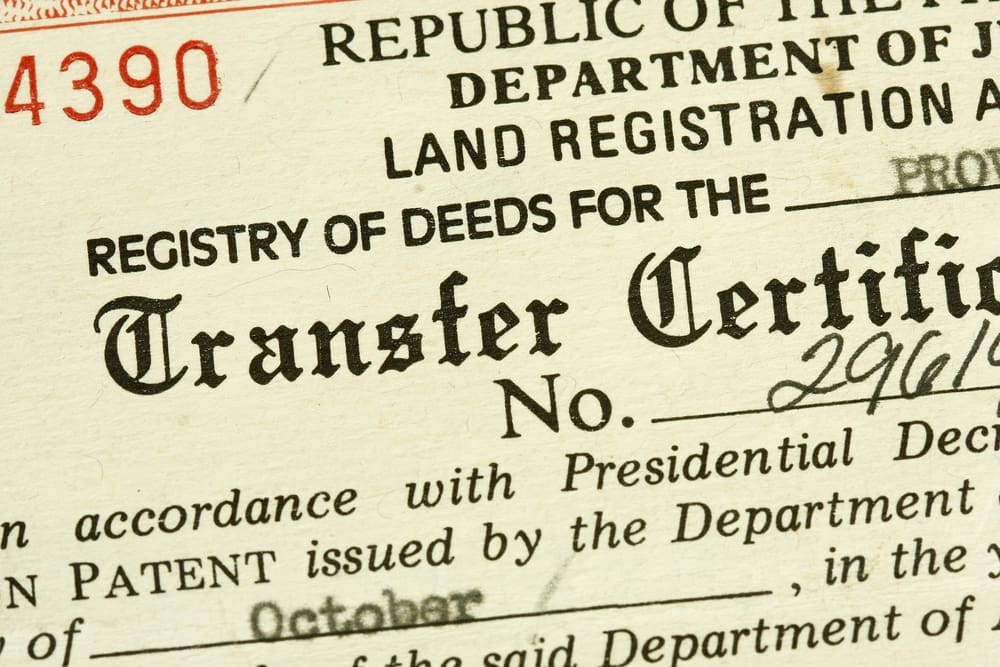 The NSW government has confirmed that Certificates of Title in paper form will be abolished as of 11 October 2021. This move is in line with the government’s goal to transition to 100% eConveyancing, which is considered a more efficient and ecofriendly way of dealing with property transactions.
The NSW government has confirmed that Certificates of Title in paper form will be abolished as of 11 October 2021. This move is in line with the government’s goal to transition to 100% eConveyancing, which is considered a more efficient and ecofriendly way of dealing with property transactions.
After 11 October 2021, Certificates of Title will no longer have to be produced to enable the registration of a dealing. Accordingly, if you have left your paper Certificate of Title in your solicitors’ care, it is recommended you liaise with them in order to ascertain whether it should be returned, stored or otherwise destroyed.
If you are the owner of unencumbered land and currently possess the Certificate of Title in relation to your property, you are not obligated to take any action to return the same to the NSW Land Registry Services.
If you wish to buy or sell property, your conveyancer will have to ensure that these new eConveyancing processes and procedures are followed. Legal practitioners and conveyancers should review their conveyancing processes to minimise the impact of these changes.
If you or your solicitors retain your Certificate of Title and you would like to discuss any issues or questions, please do not hesitate to contact our offices on 8917 8700.
Although the fear of another COVID outbreak is being felt throughout Australia, our case numbers continue to pale in comparison to those in India, which has suffered the loss of nearly 400,000 to date. It is only now that many of us truly understand the seriousness of the COVID Delta strain. Our hearts go out to all affected by this terrifying and isolating virus, whether that be in Australia or overseas.
The Australian Human Rights Commission (AHRC) recently published a research report surveying almost 60% of ASX 200 companies about their policies on addressing workplace sexual harassment. The report revealed that while companies are taking steps to address this serious issue, there is much room for improvement.
Only 60% of companies surveyed require company managers to be trained on good governance and responding to instances of sexual harassment. Furthermore, less than 20% of respondents require company directors to undertake this same training. This shows a critical gap in workplace supervisors’ awareness and ability to create safe and inclusive cultures at work. In turn, this means that many companies have reactive policies to respond to sexual harassment after the fact, rather than implementing proactive measures to prevent it in the first place.
A further issue is that only two-thirds of companies surveyed have a procedure in place for identifying risk factors relating to sexual harassment, and less than one-third publicly report information regarding sexual harassment. This creates a lack of transparency around the standards of behaviour that are acceptable at work and what is actually occurring in practice in these companies.
The AHRC’s report also includes eight recommendations for companies to improve their policies targeting workplace sexual harassment. These include measures such as setting gender diversity targets, providing employees with greater incentives to undertake further training to address sexual harassment and holding perpetrators accountable for their actions.
If you have any concerns about how you have been treated at work or would like to learn more about your rights, please do not hesitate to call us on 8917 8700.
Just as it seemed life was getting back to normal, Sydneysiders have been thrust into another lockdown. As residents prepare to stockpile their toilet paper and renew their Netflix subscriptions, fears surrounding the implications of another outbreak are being felt throughout the nation. The Delta variant of COVID-19 is officially in the community. Labelled a “strain of concern” by the WHO, the B.1.67 variant has proven more contagious and deadly than its predecessors, killing at least 400,000 Indians this year.
Here’s how to make sure you’re following the rules and staying safe this lockdown.
The rules
Sydney’s two-week lockdown is scheduled to end on Friday 9 July 2021 and expands across the Greater Sydney region (including Wollongong, the Central Coast and Blue Mountains). A fourteen-day stay at home order is also in place for all residents who left greater Sydney on or after 12 June 2021.
A Public Health Order issued by the Minister for Health directs residents in the region to wear masks in all indoor non-residential settings and on public transport and to stay at home unless absolutely necessary. There are, however, four main reasons you may be allowed to leave your home.
- Shopping for food and other essential goods and services
- Emergencies, medical care and compassionate reasons. This includes getting a COVID vaccine and visiting a romantic partner that you don’t live with
- Exercise outdoors, in groups of 10 or fewer
- Essential work or education, if it cannot be done from home. However, employers must allow employees to work at the employee’s place of residence if it is reasonably practicable to do so.
If you are dealing with a family law matter, the following exemptions may also apply to you. You may leave your home to:
- Undertake legal obligations
- Give effect to new parenting arrangements
- Pick up and drop off children at childcare.
If you feel you are at risk of domestic violence, leaving home to escape harm is also included in the list of exemptions.
For more about the rules and how they affect those in regional areas, click here.
Fines
Failure to follow the above rules will lead to an infringement notice and a possible fine of $1000. Only three days into the lockdown, 44 people had been fined for breaching Health Orders. Among those fined was Deputy Prime Minister, Barnaby Joyce, who was slapped with an infringement notice for failing to wear a mask in a petrol station.
While it seems no one will be safe from strict enforcement of the rules, Police Commissioner Michael Fuller APM noted that the police would be understanding of residents’ confusion about the application of the rules.
Vaccine rollout
In light of the 294 estimated active cases throughout the country, the Government has doubled down efforts to vaccinate Australians.
The Prime Minister announced this morning that all adults under 40 will now be able to access the AstraZeneca vaccine. However, with widespread fears surrounding the extremely narrow possibility of blood clot complications, many Australians remain hesitant.
The NSW Government has reinforced the importance of vaccination to stop the spread of the highly contagious Delta strain and prevent a constant cycle of lockdowns this winter. The efficacy of vaccination was especially evident yesterday when everyone at a Sydney birthday party became infected with COVID-19, except for the six people who were vaccinated.
For official advice about vaccinations, consult your doctor and visit health.gov.au
If you would like to learn more about this issue, or would like to discuss a legal matter, please do not hesitate to call us on 8917 8700
 Inhumane immigration policies have once again inspired public outrage throughout the nation. As new information comes to light about the treatment of infants in detention facilities, Australia’s focus has been squarely on the Murugappan family. If you haven’t heard of them, here’s what’s happened so far.
Inhumane immigration policies have once again inspired public outrage throughout the nation. As new information comes to light about the treatment of infants in detention facilities, Australia’s focus has been squarely on the Murugappan family. If you haven’t heard of them, here’s what’s happened so far.
Nades and Priya Murugappan, members of a highly-persecuted Tamil group, fled Sri Lanka in 2012 and 2013. Although they explained horrific experiences, watching watching loved ones killed in front of them, upon their arrival in Australia, both were denied refugee status. They were granted temporary bridging visas, and were moved to Biloela, Queensland, with their two daughters Kopica (6) and Tharnicaa (3) who were born in Australia.
Once these visas expired, the family was immediately placed in detention in Melbourne, and then on Christmas Island. The Murugappan's situation led to intensive public pressure, primarily by the Biloela community who initiated the ‘Home to Bilo’ campaign, which gained nationwide attention. Deportation back to Sri Lanka was set for 2019, however a last-minute injunction to prevent their removal was granted. The family and their supporters made numerous attempts to attain temporary visas, but were continuously rejected.
Public backlash heightened in June 2021 when it was leaked that 3-year-old Kopica had been diagnosed with a life-threatening blood infection, caused by untreated pneumonia. Security at the detention centre had refused to call medical detention for the sick child for nearly 10 days. While Kopica and her mother were eventually released to go to a Perth hospital, Kopica’s father and older sister have been forced to remain in detention.
Attempts to reunite the family have strengthened throughout the country, especially on social media, where Australians are voicing their concerns. Although the Minister for Home Affairs, Karen Andrews, has discretionary power to reunite the Murugappans, calls to permanently resettle the family in Australia have been flatly rejected.
Ideological conflicts between committing to strong border protection and exercising discretion in circumstances involving children have also sparked disagreement within the government.
Ultimately folding to the public pressure, Immigration Minister Alex Hawke has allowed the family to leave the detention centre and reside in Perth. However, the question that now needs to be answered is whether they will be allowed to permanently reside in Australia.
If you would like to learn more about this issue, or would like to discuss a legal matter, please do not hesitate to call us on 8917 8700.

According to the Australian Institute of Health and Welfare, almost 2 million Australians over the age of 15 had been sexually assaulted one or more times. Those affected by sexual assault are prone to emotional stress, psychological trauma and feelings of disconnection from daily life.
In light of recent events like Sexual Assault Awareness Month and the recent trial of Saxon Mullins’ attacker, the New South Wales Attorney General has announced a reform to previous NSW consent laws. NSW is now endorsing a new affirmative consent law.
What does affirmative consent entail?
For affirmative consent to be given, consent must be actively communicated and actively sought. Those providing and receiving consent would be encouraged to follow a ‘yes means yes’ mentality, rather than focusing on the existence or absence of a 'no.' New legislation would require a person seeking sexual intercourse to obtain a clear, expressed and active agreement before engaging in a sexual practice.
This is a win for survivors as it shifts the emphasis away from the victim’s actions and onto those of the accused.
The affirmative consent law has been at the forefront of Tasmania’s action against sexual assault for the past two decades without any controversy. However, Victoria does not require an accused person to provide any evidence to show the other party was consenting. Rather, the Victorian courts will look to the accused person’s perception of the victim’s conduct, such as whether the victim was intoxicated, wearing revealing clothing or not offering enough resistance to the sexual advances. If a perpetrator did take steps to ascertain consent, they have the right to use this as their defense.
NSW plans to eradicate these potential problems by adopting Affirmative consent laws and making consent steps mandatory. Thus, the NSW provision will provide protection to victim survivors while undertaking their fight for justice.
This does not, however, reverse the onus of proof. This means people accused of sexual assault still have the right to the presumption of innocence.
This NSW reform has been advantageous for survivors of sexual assault and provides more awareness regarding saying YES when providing consent.
If you are a victim of sexual assault and require support, there are several services you can reach out to. These include:
- National Sexual Assault Support: 1800RESPECT
- Blue Knot Foundation: 1300 657 380
- Bravehearts: 1800 272 831
If you have any questions or concerns about these reforms, or you would like to discuss a legal matter further, please do not hesitate to contact us on 8917 8700.
Discussions about legal rights often concentrate on adults. However, the law also protects the rights of children in significant ways. It is important that you and your children are aware of their rights at law to ensure that these rights are respected at all times.
- Right to be Heard
Children have a right to be heard in all matters affecting them. In legal proceedings, child representatives must act on the child’s instructions unless the child is not competent to give instructions.
- Schooling
It is unlawful for educational authorities, whether private or public, to discriminate against students with disabilities. However, there is an exception to this rule if the services or facilities required by a student with a disability impose an ‘unjustifiable hardship’ on that educational authority. Enlivening this condition requires exceptional or dangerous conduct, such as protecting staff and other students from violent behaviour that may arise from a student’s disability.
Students also have a right to an education free from bullying. Every government school in New South Wales must have an Anti-Bullying Plan and schools have a responsibility to implement best practice programs to tackle bullying of all kinds, including cyberbullying.
Furthermore, public schools in New South Wales must follow the Department of Education’s policy for suspending or expelling a student. Students are entitled to procedural fairness in these decisions and possess a right to appeal. The suspension and expulsion policies of private schools must also abide by principles of procedural fairness.
Finally, schoolchildren’s privacy rights differ to those of adults, as the Department of Education’s Privacy Code of Practice allows the sharing of children’s personal information between schools, parents, guardians and caregivers in specified circumstances.
- Medical Treatment
At common law, children can consent to medical treatment if they fully understand the proposed treatment. Parents cannot invalidate their child’s consent, but a Court may. If a child is not competent to consent, parents may give consent unless it is a special medical procedure that requires Court authorisation.
If you have any questions or concerns about your children’s rights, call us on 8917 8700
There is no doubt that the pandemic has been a struggle for Australian families. Whether that struggle be financial or emotional, these difficult times have forced many couples to question where their relationships stand.
Any person questioning their marriage will be faced with the defining question; Do you try to work through the problem? Or do you file for a divorce?
Situation A: I want to work on my relationship, but I don’t know how
Counselling can be effective at repairing even the most broken of relationships. Studies have shown that couples therapy is effective at restoring relationships in 75 percent of cases.
If engaging a counsellor or psychologist is out of your budget, consider developing more open communication with your partner.
Situation B: I want a divorce, but I do not know how to proceed
If you are currently in an abusive relationship or are experiencing domestic violence, there are many hotlines available to speak to someone in confidence which include:
- White Ribbon Australia: 1800 737 732
- NSW Domestic Violence Line: 1800 656 463
- Lifeline Australia: 13 11 14
If you are not in immediate danger and are considering getting a divorce or separating from your partner, contact our offices for a free consultation.
If you are currently thinking about divorce, or wish to discuss a legal matter further, please do not hesitate to contact us on 8917 8700.
 The Morrison Government's rejection of a plan to extend super to paid parental leave payments will have major consequences for Australia's newest mothers.
The Morrison Government's rejection of a plan to extend super to paid parental leave payments will have major consequences for Australia's newest mothers.
Despite speculation of reform that would require employers to pay superannuation entitlements on all paid parental leave, the hopes of working mums were crushed with the announcement of the federal budget on 11 May 2021. Proposed changes included calling for employers to provide super or pension credits to those foregoing earning income to undertake caring responsibilities. Under this plan, the federal government would be responsible for converting carer’s credits into superannuation payments. The scheme was widely praised as a positive step towards closing the gender gap in superannuation balances by ensuring that carers (who are predominantly women) are not penalised for the essential caring services that they provide.
This budget's failure to include these changes could future mums up to $13,500 over a life time.
Despite its flaws, this budget's renewed focus on women and low income earners has shocked and delighted many. The Australian Government announced it will expand super guarantee coverage for low income workers by removing the $450 per month threshold for eligibility. With 3 billion dollars allocated to women, 2021’s budget is unrecognisable from last year’s focus on construction and roads.
If you would like to learn more about the 2021-2022 budget, you feel your employer is not honouring your rights, or you would like to discuss a legal matter, please do not hesitate to contact us on 8917 8700.





